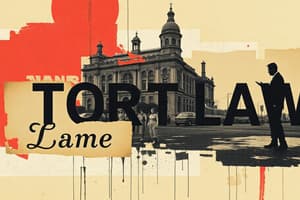Podcast
Questions and Answers
What is a key characteristic of strict liability?
What is a key characteristic of strict liability?
- It is imposed only in cases of intentional harm.
- It requires proving fault for the injury.
- It requires proof of negligence.
- It can be applied to abnormally dangerous activities. (correct)
Which of the following is considered a defense to intentional torts?
Which of the following is considered a defense to intentional torts?
- Contributory negligence
- Self-defense (correct)
- Assumption of risk
- Comparative negligence
What type of damages are designed to punish a wrongdoer?
What type of damages are designed to punish a wrongdoer?
- Non-economic losses
- Punitive damages (correct)
- Compensatory damages
- Economic losses
Which of the following best describes contributory negligence?
Which of the following best describes contributory negligence?
What is the purpose of compensatory damages in tort law?
What is the purpose of compensatory damages in tort law?
What is the main aim of tort law?
What is the main aim of tort law?
Which of the following is an example of an intentional tort?
Which of the following is an example of an intentional tort?
What are the four elements of negligence?
What are the four elements of negligence?
In tort law, what is meant by strict liability?
In tort law, what is meant by strict liability?
Which type of tort involves harming another's reputation through false statements?
Which type of tort involves harming another's reputation through false statements?
Which of the following best describes 'battery' in tort law?
Which of the following best describes 'battery' in tort law?
Which defense to negligence claims argues that the plaintiff contributed to their own harm?
Which defense to negligence claims argues that the plaintiff contributed to their own harm?
What must be proven for a claim of intentional infliction of emotional distress?
What must be proven for a claim of intentional infliction of emotional distress?
Flashcards
Tort Law
Tort Law
A type of civil law dealing with wrongs done by one person to another.
Intentional Tort
Intentional Tort
A tort where the person deliberately meant to cause harm
Negligence
Negligence
A tort where someone acted carelessly and harmed another.
Assault
Assault
Signup and view all the flashcards
Battery
Battery
Signup and view all the flashcards
Duty of Care
Duty of Care
Signup and view all the flashcards
Causation
Causation
Signup and view all the flashcards
Damages
Damages
Signup and view all the flashcards
Contributory Negligence
Contributory Negligence
Signup and view all the flashcards
Strict Liability
Strict Liability
Signup and view all the flashcards
Comparative Negligence
Comparative Negligence
Signup and view all the flashcards
Assumption of Risk
Assumption of Risk
Signup and view all the flashcards
Compensatory Damages
Compensatory Damages
Signup and view all the flashcards
Study Notes
Introduction to Tort Law
- Tort law deals with civil wrongs, where one party causes harm to another.
- It aims to compensate the injured party for damages suffered.
- The key difference from criminal law is that tort law focuses on civil remedies, not punishment.
- Torts are not necessarily intentional acts; negligence can also constitute a tort.
Types of Torts
- Intentional Torts: These involve deliberate actions intended to cause harm.
- Examples include assault, battery, false imprisonment, defamation (libel and slander), intentional infliction of emotional distress, and trespass to land or chattel.
- Negligence: This involves a failure to exercise reasonable care, resulting in harm to another.
- Elements of negligence include duty of care, breach of duty, causation, and damages.
- Professional negligence (malpractice) often occurs in medical or legal settings.
- Contributory and comparative negligence are defenses to claims of negligence, where the plaintiff's own actions contributed to the harm.
- Strict Liability: Liability regardless of fault. A defendant is liable for harm caused by inherently dangerous activities or defective products.
Intentional Torts (Detailed)
- Assault: Putting another in apprehension or fear of immediate harmful or offensive contact.
- Actual physical contact is not required.
- Battery: Harmful or offensive physical contact with another.
- Intentional and wrongful touching of another.
- False Imprisonment: Unlawful confinement or restraint of another person.
- Must be complete deprivation of freedom.
- Defamation: Publication of a false statement that harms another's reputation.
- Libel is written, slander is spoken defamation.
- Public figures require a higher standard of proof (actual malice).
- Intentional Infliction of Emotional Distress: Extreme and outrageous conduct causing severe emotional distress.
- Must be conduct beyond the bounds of decency.
- Trespass: Entering another's land without permission or interfering with possessory interests.
- Can be to land or chattel.
Negligence (Detailed)
- Duty of Care: A legal obligation to act reasonably to avoid foreseeable harm to others.
- Breach of Duty: Failure to meet the standard of care expected of a reasonable person in similar circumstances.
- Causation: The breach of duty must have directly caused the harm.
- Damages: Actual harm or loss suffered by the injured party.
- Defenses to Negligence: Contributory negligence (plaintiff's own negligence bars recovery), comparative negligence (damages reduced based on plaintiff's fault), assumption of risk (plaintiff knowingly accepted the risk of potential harm).
Strict Liability (Detailed)
- Strict liability is imposed without proving fault.
- This applies to abnormally dangerous activities (e.g., blasting) and defective products.
- Focus shifts to finding a causal connection between the defect and the injury.
Defenses to Torts
- Consent: Voluntary agreement to the harm that occurred.
- A necessary defense to many intentional torts.
- Self-Defense: Using reasonable force to protect oneself from harm.
- Defense of Others: Using reasonable force to protect another person from harm.
- Necessity: Acting to prevent significantly greater harm.
Remedies in Tort Actions
- Compensatory Damages: To restore the injured party to their original position.
- Includes economic losses (medical expenses, lost wages) and non-economic losses (pain and suffering).
- Punitive Damages: To punish the wrongdoer and deter similar conduct.
- Often awarded in cases of gross negligence or intentional torts. Note, there are limitations in the amount recoverable.
Conclusion
- Tort law is a critical aspect of civil justice.
- It aims to balance conflicting interests, preventing harm and providing compensation for injuries.
- Understanding the elements of torts will help in understanding civil law systems.
Studying That Suits You
Use AI to generate personalized quizzes and flashcards to suit your learning preferences.




